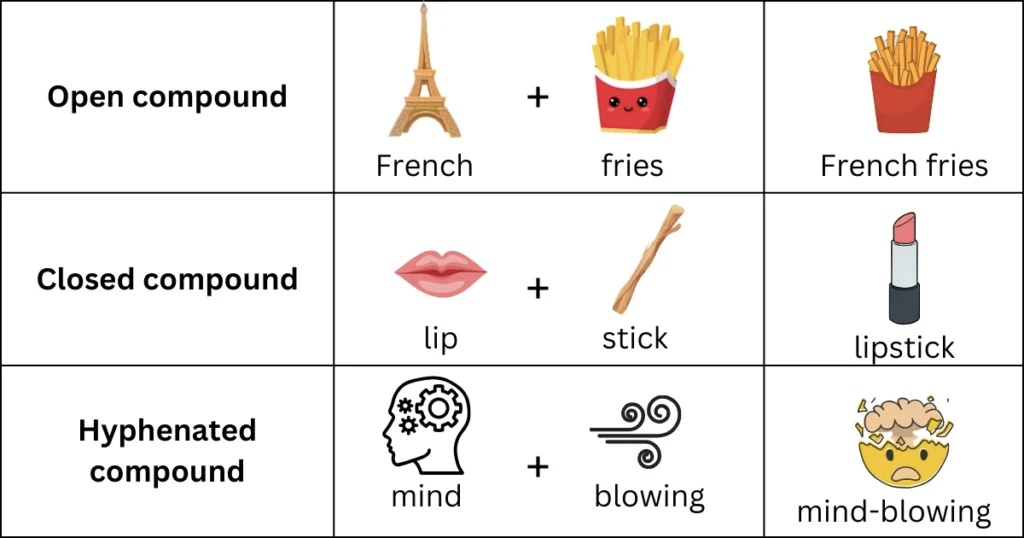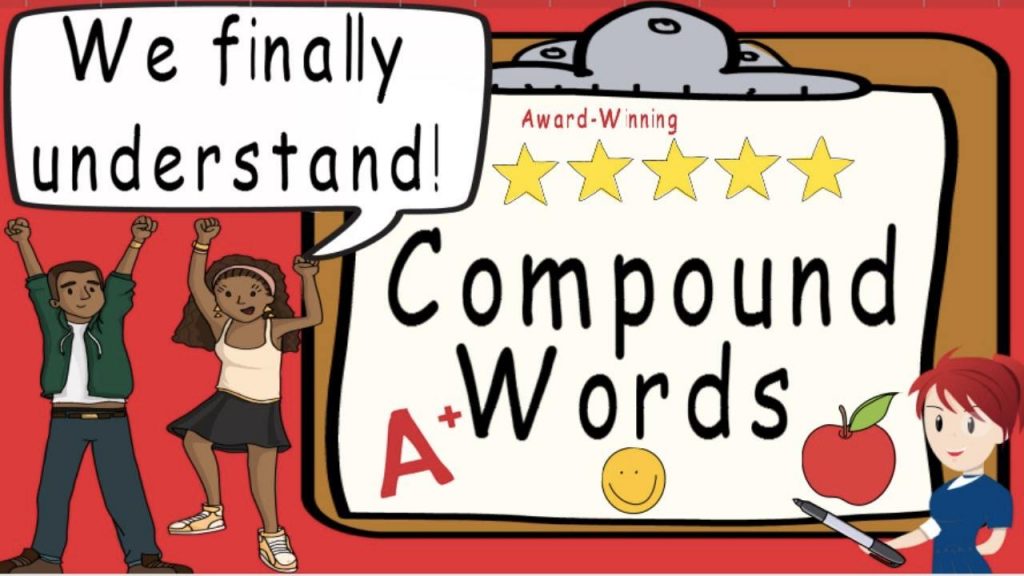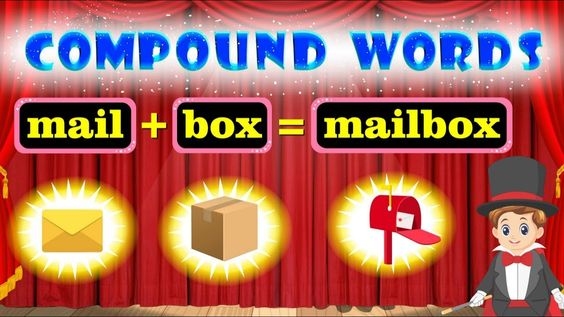Compound words for kids are everywhere, seamlessly blending into our daily language. By merging two words into one, they help kids understand each word better and grasp complex ideas. This blog will guide you through different types of compound words, provide a compound words list, and ways to teach compound words to kids. Let’s dive in!
Math & ELA | PreK To Grade 5
Kids see fun.
You see real learning outcomes.
Watch your kids fall in love with math & reading through our scientifically designed curriculum.
Parents, try for free Teachers, use for free
What are Compound Words?
Compound words are words that are formed by joining two or more smaller words together to form a new phrase that has a different meaning.
Here are some compound words examples:
- Sunflower – Combines “sun” and “flower.”
- Toothbrush – Merges “tooth” and “brush.”
- Playground – Joins “play” and “ground.”
What Are the Types of Compound Words for Kids?

Now that we know what compound words are, let us understand what are the types of compound words that students should know and understand. You can focus on the utility of compound words to help students learn them better.
| Type of Compound Word | Definition | Examples |
|---|---|---|
| Closed Compound Words | Wherein two words come together to form a completely new type of word. | Base + Ball = Baseball |
| Open Compound Words | When a modifying adjective is added to a noun to create a new noun, that is an open compound word. | Store + Room = Storeroom |
| Hyphenated Compound Words | When two or more words are connected by one or more hyphens. They often retain a clearer link to their original meanings than other compound word types. | Father-in-law, Well-known |
List of 150 Examples of Compound Words for Kids
Compound words come in all variations, making them an important topic to focus on as kids progress from grade to grade. You can use these 150 examples of compound words to teach kids about the subject area within your own lesson plan.
50 Closed Compound Word Examples: A Complete List
| Word Parts | Close Compound Word | ||
| After + noon | Afternoon | Angel + fish | Angelfish |
| Air + plane | Airplane | Any + body | Anybody |
| Air + port | Airport | Any + one | Anyone |
| Arm + chair | Armchair | Arm + pit | Armpit |
| Basket + ball | Basketball | Bath + tub | Bathtub |
| Bed + room | Bedroom | Birth + place | Birthplace |
| Blue + berry | Blueberry | Body + guard | Bodyguard |
| Book + store | Bookstore | Brain + storm | Brainstorm |
| Bull + frog | Bullfrog | Bus + boy | Busboy |
| Butter + fly | Butterfly | Cab + driver | Cabdriver |
| Can + not | Cannot | Candle + stick | Candlestick |
| Cat + fish | Catfish | Cave + man | Caveman |
| Cross + bow | Crossbow | Cross + walk | Crosswalk |
| Day + break | Daybreak | Day + dream | Daydream |
| Day + light | Daylight | Desk + top | Desktop |
| Dog + house | Doghouse | Door + bell | Doorbell |
| Door + mat | Doormat | Down + hill | Downhill |
| Dragon + fly | Dragonfly | Drop + down | Dropdown |
| Dust + bin | Dustbin | Every + thing | Everything |
| Extra + curricular | Extracurricular | Eye + ball | Eyeball |
| Eye + brow | Eyebrow | Finger + nail | Fingernail |
| Fire + cracker | Firecracker | Fish + bowl | Fishbowl |
| Fisher + man | Fisherman | Foot + ball | Football |
| Foot + path | Footpath | ||
50 Open Compound Words Examples: A Complete List
| Word Parts | Open Compound Word | ||
| Ice | Ice Cream | Post | Post Office |
| Living | Living Room | Full | Full Moon |
| High | High School | Real | Real Estate |
| Half | Half Time | Bath | Bath Towel |
| Hot | Hot Dog | Swimming | Swimming Pool |
| Fire | Fire Drill | North | North Pole |
| Middle | Middle Class | Police | Police Officer |
| Grand | Grand Opening | Class | Class Room |
| Web | Web Page | Washing | Washing Machine |
| Bus | Bus Stop | Coffee | Coffee Shop |
| Data | Data Center | Voice | Voice Mail |
| Master | Master Key | Roller | Roller Coaster |
| Dining | Dining Room | Cell | Cell Phone |
| Play | Play Ground | Snake | Snake Bite |
| Merry | Merry Go Round | Sick | Sick Leave |
| Waiting | Waiting Room | Bed | Bed Room |
| Arm | Arm Chair | Note | Note Book |
| Space | Space Station | Video | Video Game |
| Solar | Solar System | Race | Race Track |
| Flower | Flower Pot | Dinner | Dinner Table |
| Motor | Motor Boat | Parking | Parking Lot |
| Long | Long Jump | Rock | Rock Band |
| Guard | Guard Rail | Smoke | Smoke Detector |
| Ice | Ice Skating | Snow | Snow Man |
| Credit | Credit Card | Light | Light Year |
50 Hyphenated Compound Words: A Complete List
| Word Part | Hyphenated Compound Words | ||
| Father | Father-in-law | Mother | Mother-in-law |
| Well | Well-being | Long | Long-term |
| High | High-speed | Short | Short-term |
| Check | Check-in | Double | Double-check |
| Half | Half-baked | Merry | Merry-go-round |
| Part | Part-time | Full | Full-time |
| Sister | Sister-in-law | Brother | Brother-in-law |
| Editor | Editor-in-chief | Up | Up-to-date |
| Long | Long-lasting | Mass | Mass-produced |
| Well | Well-known | Old | Old-fashioned |
| Wide | Wide-ranging | Hand | Hand-picked |
| Middle | Middle-aged | Brand | Brand-new |
| State | State-of-the-art | Self | Self-esteem |
| Self | Self-control | Dry | Dry-cleaning |
| Second | Second-hand | All | All-inclusive |
| Vice | Vice-president | Cross | Cross-section |
| Cross | Cross-reference | X | X-ray |
| T | T-shirt | Decision | Decision-making |
| Free | Free-for-all | Hand | Hand-to-hand |
| Step | Step-by-step | Self | Self-aware |
| End | End-to-end | Well | Well-documented |
| Cost | Cost-effective | Two | Two-thirds |
| Energy | Energy-efficient | User | User-friendly |
| All | All-out | Far | Far-reaching |
| Single | Single-minded | Duty | Duty-free |
8 Fun Ways of Teaching Compound Words to Kids

Teachers should look for two essential elements when explaining compound words to students:
- You should remember to explain that compound words can have new meanings when connecting two smaller words.
- You should also clarify that complex words can be three words coming together to form a new word. Compound words can be multi-syllable, but not all multi-syllable words are compound words. This should help kids understand what they are without feeling confused.
Compound words for kids can be complicated to pick up through verbal instructions alone. You can focus on games, puzzles, toys, and exercises to get kids to understand the utility and versatility of compound words.Here are some fun ways to get started:
1. Fill in the Blanks
In this activity, kids are provided with partially completed compound words, where each missing letter is represented by an underscore. For instance, ‘B__ksh__lf’ corresponds to the compound word ‘bookshelf’. Kids are tasked with identifying the missing letters and filling them in to form the complete compound word accurately. This exercise strengthens kids’ understanding of compound word structures and improves their spelling proficiency.
Here are some fun complete the compound word worksheets:
2. Compound Words Matching
In this engaging activity, kids are given two lists of words on a worksheet. Their task is to draw lines connecting words from the first list to the appropriate words in the second list to form compound words. This matching game not only makes learning fun but also enhances their ability to recognize how two different words can combine to form a new word with a new meaning.
Here are some fun compound words matching worksheet:
3. Name the Compound Word
This activity utilizes visual learning to solidify the concept of compound words. Kids are presented with pairs of images, each representing one word. Below each pair is a blank space where kids write the compound word that combines the two images. For example, a picture of a dog and a house would be combined to form “doghouse.” This visual association aids in better memory retention and understanding of compound words.
Get started with this printable worksheet:
4. Identifying Compound Words in Stories
By reading through books and short stories, you can ask kids to identify compound words within the text. This will help them understand why we use compound words in English and how they impact contextualization and structuring.
5. Sing-Alongs
You can make poems and songs on compound words and use songs to help kids enjoy learning about compound words naturally. You can also bring props to demonstrate which words are compound words and which aren’t.
6. Chopping Words
You can print out compound words on paper in a nice bold font and have your kids cut in the middle of the compound word to create two words. If your kids understand compound words correctly, they should be able to cut the compound word’s original root words.
7. Determining Which is Compound & Non-Compound
You can play a game with your students to help them understand compound words better. By giving them two options and asking them to figure out whether they are compound words or not, you can test their abilities organically. You can also provide references and compound words list examples.
8. Draw the Compound Word
This gives your kids a kinesthetic way of learning about compound words through painting. Kids can paint out the compound word based on the prompt shared with them. For instance, they can be given sun + screen, and they must draw a tube of sunscreen.
Discover more online educational resources and printable worksheets for kids that will help with their learning experience and make them smarter.
Related Reading: How Can Teachers Help English Language Learners
Conclusion
Understanding compound words is key for kids. By exploring this compound words list, they can grasp simple compound words effortlessly. Encouraging kids to recognize and use compound words in everyday language lays a strong foundation for their vocabulary skills. With practice and exposure, children can confidently navigate the world of compound words.
Related Reading: Sight Words for First Graders That Kids
Frequently Asked Questions(FAQs)
Can you use flashcards to teach compound words ?
Yes, flashcards are an effective way to teach compound words to kids. You can print them out as a teaching tool when exploring complex compound words.
Why do kids need to learn compound words?
The etymology and utility of compound words are essential to teaching kids to make them more comfortable with speaking, understanding, writing, and listening to the English language.
How to introduce compound words to young kids?
You can introduce compound words to kids through multiple strategies, such as with toys, props, storytelling, and games.
What are some compound words for kindergarten?
Examples include “sunflower,” “rainbow,” and “cupcake.”
What are some compound words for 2nd graders?
2nd graders might encounter words like “skateboard,” “snowflake,” and “basketball.”
What are some first grade compound words?
Examples of first grade compound words are “sunflower,” “playground,” and “toothbrush.”
































